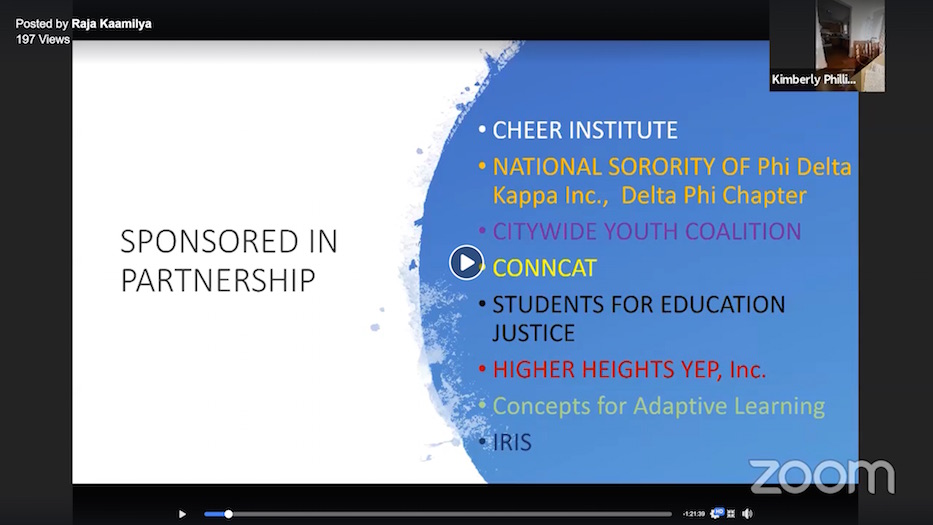| Facebook Live. “This is a moment where everyone is needed,” said Dr. Raja Staggers-Hakim. “We are used to being siloed but we have to intersect to address COVID-19.” |
Hundreds of families across the state face an excruciating choice this fall: Should they send their children to school and risk exposing their family to coronavirus? Or should they stay home and opt for distance learning?
For some families, the choice isn’t even an option, as school districts have yet to announce their decisions. The New Haven school district is expected to release its reopening decision Wednesday afternoon, in a special meeting of the city’s Board of Education at 4:30 p.m. (read the agenda here).
A newly formed coalition, Racial Equity 4 Youth, is pushing back against school reopening. Tuesday night, the group held a community conversation to discuss community-wide concerns and propose alternative solutions in a petition. Partner organizations include the CHEER Institute, National Sorority of Phi Delta Kappa Inc., Delta Phi Chapter, Citywide Youth Coalition, The Connecticut Center for Arts and Technology (ConnCAT), Students for Educational Justice, Higher Heights YEP, Inc., Concepts for Adaptive Learning, and Integrated Refugee and Immigrant Services (IRIS).
Some of the petition demands include limited, small in-person meetings, the ability for families to opt-out of in-person attendance due to health risks, student access to free and reliable Wi-Fi in their homes and public spaces, and making free meals available to both families and students.
The petition also asks for more at-home support for students students with learning disabilities, individualized learning plans, and English language learners.
Dr. Raja Staggers-Hakim, Founder and executive Director of CHEER, stressed the importance of having all voices present in community conversations.
“This is a moment where everyone is needed,” she said. “We are used to being siloed but we have to intersect to address COVID-19.”

Rashanda McCollum, the executive director of Students for Educational Justice, emphasized how COVID-19 is a public health concern among communities of color, especially Black and Latinx communities with vulnerable family members.
“A lot of our members are Brown and Black students who we know have been disproportionately affected by COVID. A good number of our members are raised by grandparents,” she noted. “So if we don’t get this under control, we could literally wipe out entire neighborhoods.”
Dennis Wilson, the director of education for IRIS, said he sees similar trends of transmission within refugee and immigrant populations. Many of the families IRIS serves are intergenerational and live in smaller housing units, making social distancing difficult.
He added that many of the English Learning students IRIS works with feel conflicted about reopening, as many have fallen behind in their English proficiency because of remote learning. They would prefer to have in person classes, but do not feel that the situation is safe enough. Students, refugee and otherwise, have voiced concerns about the ineffectiveness of distance learning in the past.
Addys Castillo, the executive director of Citywide Youth Coalition, expressed frustrations about the treatment of young people throughout the reopening process.
“We are concerned that our young people are going to be used as guinea pigs for this experiment to go back to school,” she said. “We have not been successful across the country in reaching Phase 3 [of reopening] but we are willing to take chances with our young people.”
Abdul Elrefaei, a student at Career High School who attended the meeting independently, said he was concerned that student voices were not being included in the discussions—despite the fact that they’re the ones returning to school. He also felt that school districts should have had a higher concern for student health prior to COVID-19.
“The hand sanitizer container and hand soap were never filled,” he said. “Now they care about our safety. Why wasn’t there a plan before caring for our health?”
Kimberly Phillips, president of Delta Phi Chapter, pointed out that school board meetings and other government meetings are still virtual despite the push to return to in person. She worries about the difficulty of childcare as a parent and teacher at Barnard Elementary. If she returns to work, her son will have to return in person, as she does not have proper childcare for him to stay at home.
Organizations like Higher Heights YEP (Youth Empowerment Programs), Inc and Phi Delta Kappa, Inc. (NSPDK) are looking to fill the gaps in remote learning by providing live instruction, tutoring services, and additional homework scheduled around student needs. Higher Heights presently works with more than 10,000 students in the state.
“Our students deserve the best education even during a pandemic” said Higher Heights Executive Director Dr. Chaka Felder-McEntire. “They don’t deserve to be used as guinea pigs.”
Despite the conversation’s critical lens on school reopening, ConnCAT Youth and Community Programs Manager Steven Driffin cautioned participants that conversation was not meant to lambast the district but encourage further discussion.
“We are actually just presenting concepts, ideas, thoughts,” he said. “We can’t leave any stone unturned. It could cost someone their life.”
Castillo supported the point by reminding participants that the power is in the hands of the people. At the end of the day, the group is not willing to jeopardize the life of any student.
The next meeting will be held on August 27th at 7 p.m. Registration can be found here.